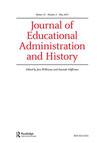Racist norms until interests converge: a long tradition of egregious educational policy patterns and global implications
IF 1.6
Q2 EDUCATION & EDUCATIONAL RESEARCH
Journal of Educational Administration and History
Pub Date : 2023-10-21
DOI:10.1080/00220620.2023.2272952
引用次数: 0
Abstract
ABSTRACTThis article contextualises the crisis in Black education and the death of a 100-year-old Black educational system resulting from an unintended consequence of Brown: the excavation of thousands of highly educated and skilled Black educators. This theoretical article advances the literature on Brown using two critical race theory (CRT) tenets, the permanence of racism and interest convergence, to discursively trace the regression of Black education. This article illustrates the myriad ways interest convergence and the permanence of racism contribute to crises in Black educational systems and the death of a 100-year-old Black educational system. A limitation of CRT in education is the homogenous treatment of Black people despite their variations and conditions. Additionally, analysing connections between Brown, ESEA, and NCLB needs further examination. Finally, I advance that Black resistance to the permanence of racism in the US had global interest convergence implications and aligned with decolonial and independence movements.KEYWORDS: Brown v. Board of EducationtakeoversCRTthe permanence of racisminterest convergenceeducational policyBlack education Disclosure statementNo potential conflict of interest was reported by the author(s).Additional informationNotes on contributorsJames WrightJames Wright, assistant professor in the Department of Educational Leadership at San Diego State University. As of Fall 2023, James is part of the School of Education at the University of California at Berkeley’s 21st Century California School Leadership Academy (21CSLA). His research critically analyses how race and culture shape educational policy and practice. Specifically, he examines how historically racialised inequities have informed contemporary educational practices and become school norms.利益趋同之前的种族主义规范:恶劣教育政策模式的悠久传统及其全球影响
【摘要】本文将黑人教育的危机和百年黑人教育体系的死亡置于布朗案的意外后果中:成千上万受过高等教育和技能的黑人教育家被挖走。本文运用“种族主义的持久性”和“利益趋同”这两个关键的种族理论原则,对黑人教育的倒退进行了论述。这篇文章阐述了利益趋同和种族主义的永久存在对黑人教育体系危机和百年黑人教育体系死亡的种种影响。CRT在教育上的一个局限是,尽管黑人有差异和条件,但对他们的待遇是同质化的。此外,分析布朗、ESEA和NCLB之间的联系需要进一步研究。最后,我提出黑人对美国种族主义的抵抗具有全球利益趋同的含义,并与非殖民化和独立运动相一致。关键词:布朗诉教育委员会接管种族主义的持久性利益趋同教育政策黑人教育披露声明作者未报告潜在利益冲突。作者简介:james Wright,圣地亚哥州立大学教育领导系助理教授。截至2023年秋季,詹姆斯是加州大学伯克利分校21世纪加州学校领导学院(21CSLA)教育学院的一员。他的研究批判性地分析了种族和文化如何影响教育政策和实践。具体而言,他研究了历史上种族化的不平等如何影响当代教育实践并成为学校规范。
本文章由计算机程序翻译,如有差异,请以英文原文为准。
求助全文
约1分钟内获得全文
求助全文
来源期刊

Journal of Educational Administration and History
EDUCATION & EDUCATIONAL RESEARCH-
CiteScore
3.80
自引率
5.60%
发文量
25
 求助内容:
求助内容: 应助结果提醒方式:
应助结果提醒方式:


